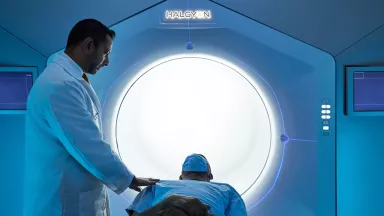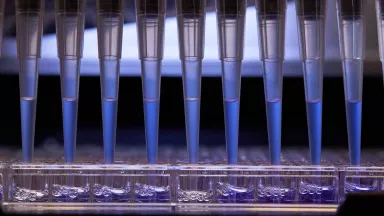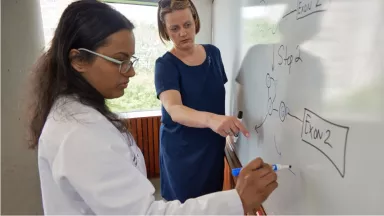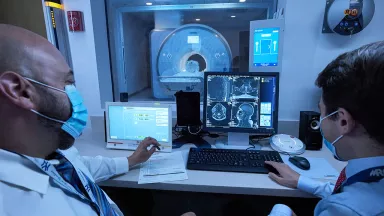Our Approach to Breast Cancer

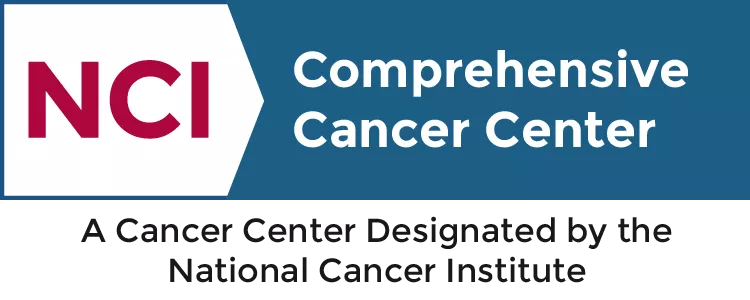

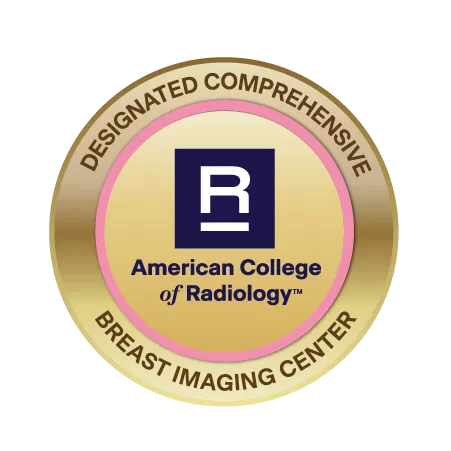
At Montefiore Einstein Comprehensive Cancer Center you’ll find state-of-the-art, comprehensive care for all types and stages of breast cancer. We combine leading-edge technology, leadership in breakthrough research, and a multidisciplinary approach that enables our world-renowned doctors and specialists across disciplines to collaborate and develop the best care plan, personalized for you.
We are among the elite 1% NCI-designated comprehensive cancer centers in the U.S. — and we are ranked in the top 1% of all U.S. hospitals for cancer care, according to U.S. News & World Report. We bring together the worlds of clinical care and academic research while keeping you—our patients—at the center of everything we do.
No two cancers are alike. Which is why we provide the highest quality personalized care to address the needs of each patient. Our accreditation from the National Accreditation Program for Breast Cancers reflects our commitment to comprehensive, integrated breast cancer care from a multidisciplinary team.
We’re focused on helping you get from uncertainty to an accurate diagnosis, fast. Then we streamline your treatment with same-day combined appointments and assign a dedicated team to generate a personalized care plan.
Come to Montefiore Einstein Breast Care Center for all the resources and support you and your family need to manage breast cancer risk, diagnosis, and treatment—and any concerns you may have about side effects and follow-up care.
Screening & High-Risk Prevention & Surveillance
When breast cancer is spotted early, and is in the localized stage, the survival rate is 99%*, so if you’re 40 and over, or have other risk factors, it may be time to get tested for breast cancer. Talk to your doctor about your risk for breast cancer, and what level of screening and monitoring is right for you. We offer a community breast cancer screening program to find breast cancer at early stages, when it’s typically easier to effectively treat.
*According to the American Cancer Society 5-year tracked, survival rate based on the NCI-maintained SEER database.
Our High-Risk Prevention and Surveillance Program might be right for you if you’ve had cancer before, cancer is in your family, or you have breast biopsy test results showing an increase in risk. Contact us with questions. Through this program we offer:
- Formal clinical risk assessment
- Genetics evaluation
- Clinical examination
- Breast imaging, including mammogram, ultrasound and MRI optimally scheduled to detect cancer as early as possible
- Prevention strategies to reduce risk and ensure early diagnosis, such as lifestyle changes and preventive surgery in select cases
Montefiore Einstein’s New, State-of-the-Art Breast Care Center
Diagnosis & Staging
To ensure the best possible outcomes, the breast specialists at Montefiore Einstein Comprehensive Cancer Center provide you with care that includes before, during and after treatment services.
Whatever prompts you to seek a diagnosis—results from a screening program, advice from your primary care doctor, or through worrisome breast changes you notice on a self-exam—we recognize that it can be an anxious time. That’s why we focus on getting answers quickly.
Our breast specialists and surgeons use sophisticated tests to diagnose and determine what type and stage of breast cancer is present. Examples include:
- Breast ultrasound
- Diagnostic mammograms
- Breast magnetic resonance imaging (MRI)
- Biopsy
Staging is an important part of diagnosing breast cancer that involves figuring out how far cancer cells have spread beyond the breast—if at all. Your next steps in treatment are likely influenced by whether the cancer is only in your breast, or also detected in the lymph nodes under your arm—or has spread past these areas.
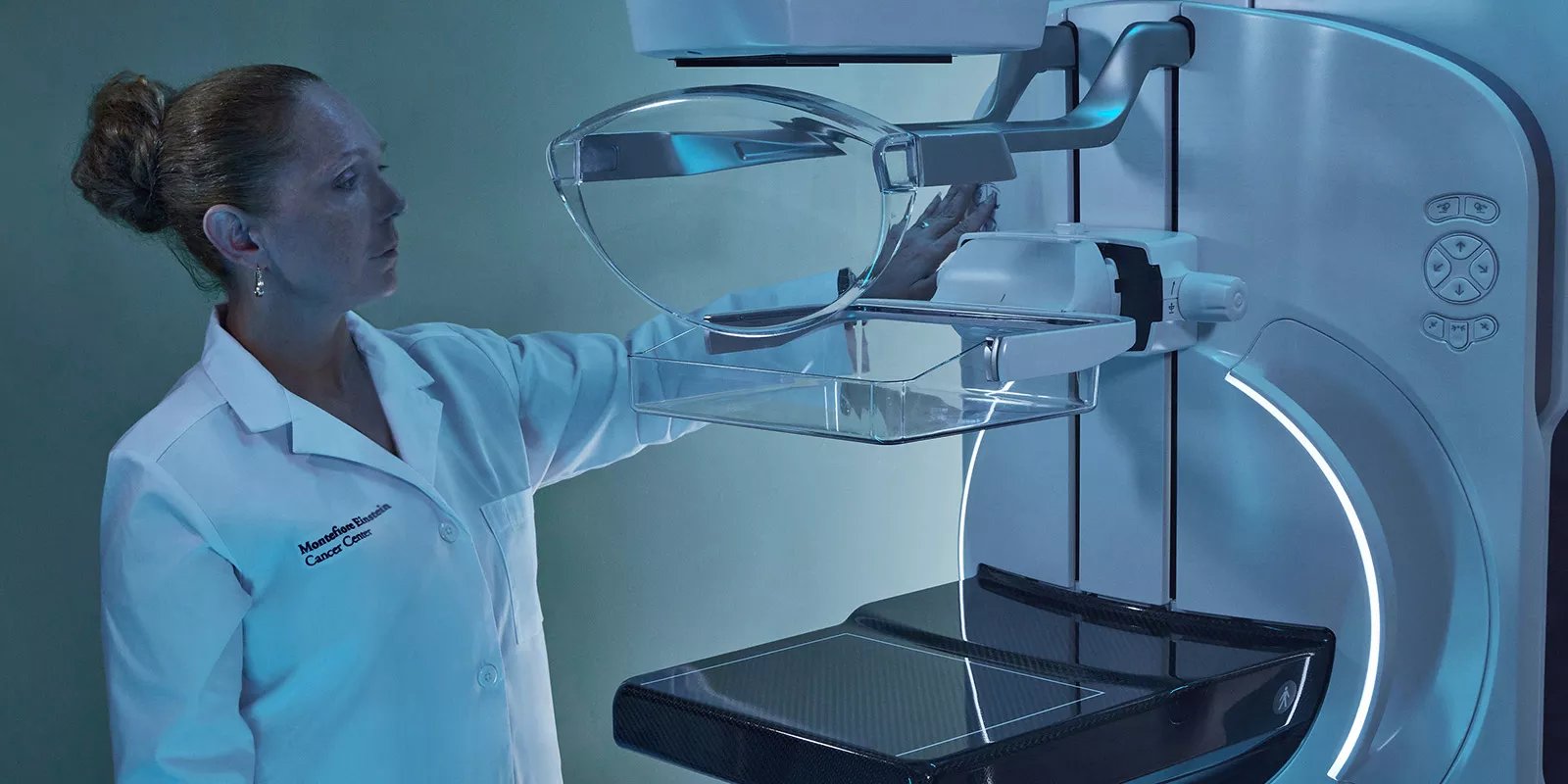
Innovative Treatments
We offer sophisticated treatment options for breast cancer at all stages from providers highly skilled in breast cancer surgery, radiation therapy, and chemotherapy.
Depending on the stage and extent of cancer spread, surgery for breast cancer may include:
- Mastectomy, when we remove the entire affected breast and sometimes nearby lymph nodes
- Lumpectomy, when we remove a smaller amount of breast tissue that contains cancer, or simply send the sample to a pathology lab to determine if it contains cancer cells
- Reconstructive surgery options to rebuild the shape and look of the breast after surgery, such as immediate implant total breast reconstruction.
Intraoperative Navigation System
This approach enables the surgeon to pinpoint, with a high level of precision, the area of the breast that requires removal. We place a tiny radioactive seed (a small metal object) in the breast before surgery. That seed guides the surgeon very precisely to remove the tissue through a hidden cosmetic incision. Accuracy and removal of all cancerous breast tissue dramatically reduces the likelihood of needing more surgeries in the area.
Minimally Invasive Cryoablation
Cryoablation is a minimally invasive alternative to lumpectomy for increasing numbers of breast cancer patients. With this advanced, targeted approach, we make a small needle puncture and deliver liquid nitrogen to destroy tumors by freezing them. Cryoablation is FDA-approved for women over age 70 with non-aggressive tumors visible on ultrasound. It offers the benefit of leaving surrounding normal breast tissue unaffected—with no visible scarring. The procedure is done in a doctor’s office or radiology suite and only requires local anesthesia.
In 2025, with the expansion of the FDA criteria for cryoablation, the agency cited findings that the approach leads to outcomes similar to surgery (the same local recurrence rate) but with a faster recovery and generally less disruption to the patient’s life. Montefiore Einstein Comprehensive Cancer Center investigators contributed to a multicenter study (ICE3 Trial) that reported a 5-year local breast recurrence rate of 4.3% following cryoablation—with no surgery required and minimal downtime for patients.
Advanced Radiation Techniques
State-of-the-art radiation therapy options we offer at The New York Proton Center and elsewhere include:
- Intensity modulated radiation therapy (IMRT): X-ray and proton beams of varying intensity and shape deliver radiation that matches your tumor’s exact shape and size.
- Deep inspiration breath hold (DIBH): Radiation is synchronized with deep breathing to protect the heart muscle.
- Prone breast radiation treatment: This treatment requires that you lie on your stomach on a specially designed table allowing the breast to hang freely below your body.
- Partial breast irradiation: We treat a specific location on your breast with precise radiation beams, highly-advanced implanted pellets and, in some cases, both.
- Proton therapy: High-energy beams of positively charged electric particles (protons) provide precision treatment to tumors while sparing surrounding tissues.
For selected patients with early-stage, estrogen-receptor- positive breast cancer, we offer intraoperative radiation therapy. This high-tech approach involves receiving targeted radiation treatment during surgery, and enables patients to avoid the time commitment and side effects of external beam radiation. For many patients over age 50 with small breast cancers we can offer IORT during lumpectomy surgery, helping to conserve breast tissue in many cases. We have treated over 300 patients with breast IORT, 85 percent of whom didn’t need any additional radiation treatment visits. For people who develop a second, local occurrence following previous breast cancer treatment, we can often use IORT as an alternative to mastectomy and help preserve the breast.
Breast Appearance & Cosmetics
Many people undergoing breast cancer surgery express the strong desire to preserve the normal appearance of the breast as much as possible while removing all evidence of cancer. We offer several routes to ensure this occurs. For example, if a mastectomy is required, we offer breast reconstruction surgery along with a procedure designed to preserve the skin and nipple of the breast.
We routinely partner with plastic surgeons who use leading-edge oncoplastic techniques to hide scars and save healthy breast tissue, and in some situations our breast and plastic surgery team can offer an “immediate implant total breast reconstruction” right after a mastectomy, reducing the overall time a patient is in surgery and lowering the risk of infection. This procedure saves the chest muscle and results in a natural look, with breasts sitting higher up and appearing more youthful. Most patients can go home within one or two days and do not need an expander, a device often used in traditional reconstruction.
Chemotherapy
At Montefiore Einstein Comprehensive Cancer Center we may prescribe chemotherapy drugs before surgery, to shrink the tumor and lessen the amount that needs to be taken out with surgery. After surgery, chemotherapy or other types of drugs such as hormone therapies, targeted therapies, or immunotherapies may be recommended to help eliminate any leftover cancer cells.
When chemotherapy is recommended, we can often offer a scalp-cooling approach that helps lessen hair loss—for all hair types and textures. New York State is the first in the nation to require that insurance companies cover the cost of scalp cooling for chemotherapy. Ask your healthcare team about your options.
Access to Clinical Trials
Clinical trials may offer you innovative treatment options not yet available elsewhere. Through breast cancer clinical trials, we’ve examined:
- Ways to eliminate the need for radiation treatment in select patients
- The benefits and drawbacks of Intraoperative Radiation Therapy (IORT), which is radiation delivered during breast cancer surgery
- Which patients benefit from axillary radiation versus additional axillary surgery
We’ll let you know about any breast cancer clinical trials options that might be right for you, so you can consider the option.
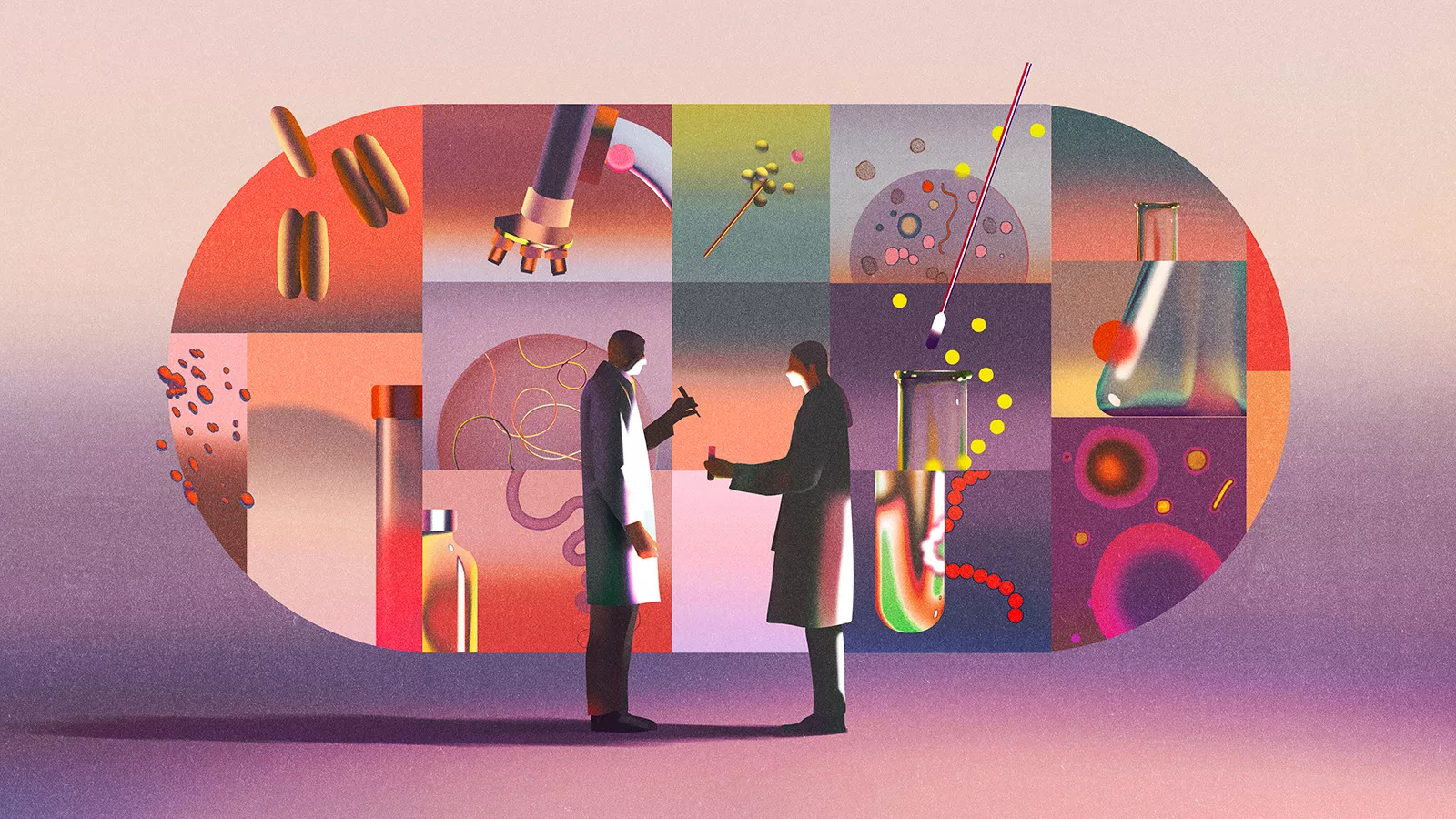
Featured Breast Cancer Clinical Trials
- Breast Cancer
I-SPY TRIAL: Neoadjuvant and Personalized Adaptive Novel Agents to Treat Breast Cancer
-
Conditions
Breast Cancer
- Breast Cancer
- Endometrial Cancer
- Gastric Cancer
- Ovarian Cancer
(VELA) Study of BLU-222 in Advanced Solid Tumors
-
Conditions
Breast Cancer, Endometrial Cancer, Gastric Cancer, Ovarian Cancer
- Triple Negative Breast Cancer
Study of Sacituzumab Govitecan-hziy and Pembrolizumab Versus Treatment of Physician's Choice in Patients With Triple Negative Breast Cancer Who Have Residual Invasive Disease After Surgery and Neoadjuvant Therapy (ASCENT-05/AFT-65 OptimICE-RD/NSABP B-63)
-
Conditions
Triple Negative Breast Cancer

Holistic Care
We know that a breast cancer diagnosis can be scary and overwhelming, which is why we combine evidence-based care rooted in science with a holistic approach sensitive to your overall well-being—physical, emotional, and otherwise. To support you and your family we work hard to make sure you have easy access to:
- The doctors and nurses caring for you
- Same-day, combined appointments with experts in surgery, breast reconstruction surgery, radiation oncology, medical oncology, genetics counseling, and more
- Same-day diagnostic evaluations with mammography, breast ultrasound, and minimally invasive needle biopsy
- Educational materials to help you make informed decisions with your treatment team
- Peer support from volunteers with our Bronx Oncology Living Daily (BOLD) program
- Advice and on-the-ground input and care—if you want it—from social workers, nutritionists and therapists with expertise in yoga, acupuncture, massage, and more
Lymphedema Prevention
Sometimes, surgery for breast cancer leads to fluid build-up due to damage to the lymph nodes. This is called lymphedema. We’re sensitive to this risk and work to limit the likelihood it happens, through measures such as:
- Avoiding lymph node removal when possible
- Axillary reverse mapping, a technique that limits lymph node surgery and preserves the axillary nodes that drain the arm
- Careful monitoring of lymph node surgery patients with bioimpedance spectroscopy, a non-invasive tool to spot early increases in arm volume
- Adopting LYMPHA, (LYmphatic Microsurgical Preventive Healing Approach) a procedure where a lymphatic vessel is re-attached to a vein branch in the axilla to preserve lymph drainage and reduce risk of lymphedema
Care Navigation & Support Services
At Montefiore Einstein Comprehensive Cancer Center, we’re focused on breast health and the prevention, early diagnosis and treatment of cancer. We offer comprehensive traditional and holistic care, from screening and diagnosis through survivorship as well as resources for care navigation, mental health and wellness services and other supportive programs like financial counseling and rehabilitation. Much of this care and these services are now available at our ultra-modern Breast Care Center in the Bronx.
Your Breast Cancer Team
Our multidisciplinary team of breast cancer experts are at the forefront of cancer care and development of therapies to treat breast cancer at all stages. From prevention to treatment options, we will propose an individualized treatment plan that fits your needs and lifestyle.
Specialty Care
Our team of experts creates a personalized treatment plan tailored for you. Your treatment plan may include care from experts in:
- Medical oncology
- Radiation oncology
- Surgical oncology
- Radiology
- Pathology
- Plastic surgery
- Genetics
- Lymphedema care
- Patient navigation
- Social work
- Psychology
- Breast cancer education
About Breast Cancer
Breasts are largely made of a combination of fibers and fatty tissue that give them their shape and size. However, breasts also include blood and lymph vessels, as well as lobes and ducts. In women, the lobes branch out into smaller lobules that end in milk-producing bulbs. The ducts link the bulbs, lobules and lobes in order to carry milk to the nipple.
While most common in females, breast cancer can also occur in males.
Types of Breast Cancer
There are different kinds of breast cancer:
- Non-invasive (in situ) breast cancer: Cancer forms in the milk ducts and does not spread to other breast tissue.
- Invasive ductal carcinoma: Cancer forms in the cells lining the ducts. This is the most common form of breast cancer in women and men.
- Invasive lobular carcinoma: Cancer cells grow in the lobes or lobules, sometimes in both breasts.
- HER2 positive breast cancer: HER2 is a protein found in some breast cancer cells. Too much of the HER2 protein makes cancer grow.
- Hormone-receptor positive breast cancer: The cancer cells include protein receptors that bind with estrogen or progesterone hormones. The cancer cells need these hormones to grow.
- Triple negative breast cancer: These cancer cells have no receptors for estrogen and progesterone. They do not make any (or too much) of the HER2 protein.
- Paget’s disease: Abnormal cells grow beneath or on the surface of the nipple.
- Inflammatory carcinoma: This rare type of cancer causes the breast to become red, swollen and warm.


